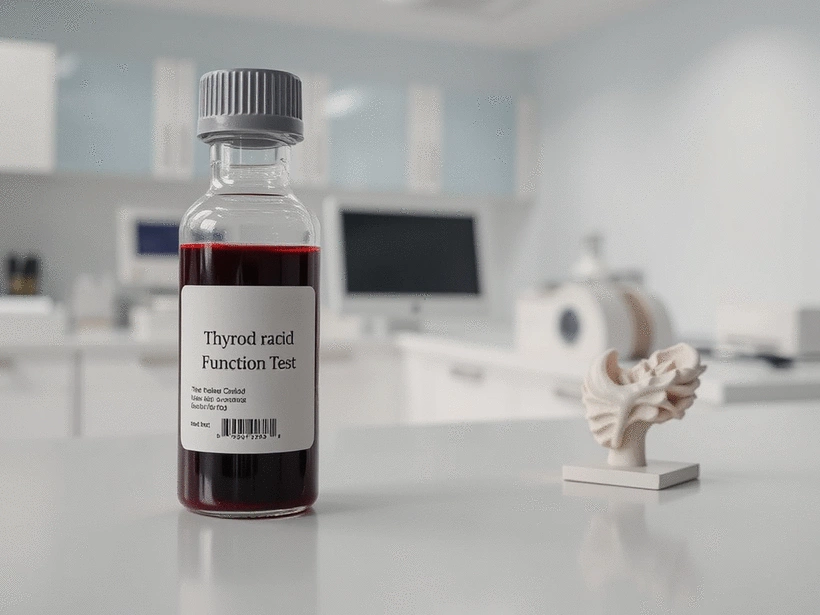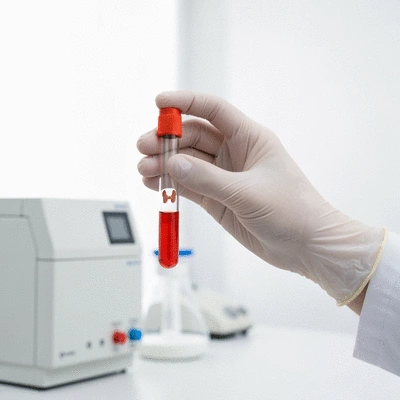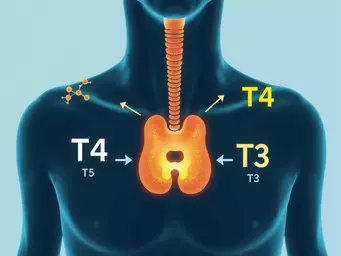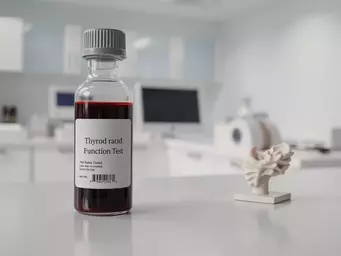Thyroid Function Tests Explained Simply

Understanding Your Thyroid Health: A Comprehensive Guide to Function Tests
Understanding your thyroid health is not just about managing symptoms; it’s about empowering yourself with knowledge. Did you know that nearly 20 million Americans have some form of thyroid disease? Knowing how to interpret thyroid function tests can be a game changer for your health journey.
What You Will Learn
- Thyroid function tests reveal critical hormone levels, including TSH, Free T4, and Free T3, essential for diagnosing thyroid conditions.
- Symptoms of hypothyroidism, such as fatigue and weight gain, can significantly affect daily life, making awareness crucial for timely diagnosis.
- Interpreting test results alongside symptoms can lead to better treatment strategies tailored to your needs.
- Consultation with an endocrinologist can provide personalized management plans for thyroid health, emphasizing the importance of patient engagement.
The Thyroid Function Test Journey
Understanding the process of thyroid function tests, from initial symptoms to expert consultation and ongoing management.
Step 1
Recognize Symptoms
Fatigue, weight gain, cold intolerance, dry skin, mood swings.
Step 2
Initial Tests
TSH, Free T4, Free T3 measurements.
Step 3
Connect Symptoms & Results
Align personal feelings with lab outcomes.
Step 4
Consult Endocrinologist & Treatment
Personalized plan, medication (Levothyroxine, etc.), monitoring.
Understanding the Basics of Thyroid Function Tests
Thyroid function tests are essential tools that help us understand how well your thyroid gland is working. Think of these tests as a window into your body's metabolic engine. By measuring specific hormones, we can identify if your thyroid is underactive or overactive, which is crucial for effective management of conditions like hypothyroidism. For a detailed overview of these tests, you can refer to resources like the American Thyroid Association's guide on thyroid function tests.

These tests are important not just for diagnosing thyroid issues but also for monitoring treatment effectiveness. If you're experiencing symptoms that you suspect could be related to thyroid dysfunction, understanding these tests can empower you to take charge of your health!
What are Thyroid Function Tests and Why are They Important?
Thyroid function tests typically include measurements of hormones such as Thyroid-Stimulating Hormone (TSH), Free T4, and Free T3. These tests provide crucial information about how your thyroid is functioning and whether it’s producing the right amount of hormones. The British Thyroid Foundation also offers comprehensive information on thyroid function tests.
- TSH (Thyroid-Stimulating Hormone): Signals your thyroid to produce hormones.
- Free T4: The primary hormone produced by the thyroid gland, crucial for metabolism.
- Free T3: The active form of thyroid hormone that influences energy levels.
These tests are vital for diagnosing conditions like hypothyroidism, where the thyroid is underactive, leading to a host of symptoms that can impact your quality of life.
The Role of Thyroid Hormones in Body Functioning
Thyroid hormones play a pivotal role in regulating your metabolism, energy levels, and overall hormonal balance. They influence how your body uses energy and affects everything from heart rate to digestion.
When your thyroid hormones are not in balance, you may experience various symptoms, such as fatigue, weight gain, and even mood changes. It's essential to understand how these hormones function so you can recognize when something is off.
Common Symptoms of Hypothyroidism and Their Impact on Health
Hypothyroidism can manifest through a range of symptoms, often leading individuals to feel overwhelmed. Common symptoms include:
- Fatigue and low energy
- Weight gain or difficulty losing weight
- Cold intolerance
- Dry skin and hair
- Depression and mood swings
If you're experiencing any of these symptoms, it's important to consult with a healthcare professional. Recognizing the impact of hypothyroidism on your daily life can motivate you to seek testing and appropriate management.
Key Tests for Assessing Thyroid Function
Understanding the key tests for assessing thyroid function is vital in navigating your thyroid health. These tests provide a deeper insight into how your thyroid functions and what might be going wrong. For more in-depth medical information, you can explore resources like NCBI's detailed article on thyroid function tests.
We Want to Hear From You!
Have you experienced any symptoms of hypothyroidism? Understanding your journey can help others in similar situations. Share your thoughts below:
Frequently Asked Questions About Thyroid Function Tests
Here are some common questions to help you better understand thyroid function tests and their implications:
Summarizing the Importance of Thyroid Function Tests
Understanding your thyroid function is crucial for overall health, particularly for those experiencing symptoms of hypothyroidism. Thyroid function tests provide a window into how well your thyroid is operating, allowing you and your healthcare provider to grasp the underlying issues affecting your health. These tests are not just numbers on a lab report—they can illuminate a path toward better management of your thyroid condition and overall well-being.
It’s essential to connect the symptoms you experience with the results from your thyroid function tests. This connection can lead to a more accurate diagnosis and tailored treatment options. For example, if you notice persistent fatigue or weight gain, discussing these symptoms alongside your test results with your healthcare provider can guide them in developing a targeted approach to your care.
Connecting Symptoms to Test Results for Better Diagnosis
When addressing thyroid health, aligning symptoms with test results can be a game changer! Here are some common symptoms to watch for:
- Fatigue and low energy levels
- Unexplained weight gain or difficulty losing weight
- Cold intolerance or feeling unusually cold
- Dry skin and brittle hair
- Constipation

By discussing these symptoms with your endocrinologist, you can achieve a clearer understanding of the relationship between your clinical presentation and your thyroid function test results. This dialogue is not just valuable; it’s essential for effective treatment planning.
Next Steps: Consulting with Healthcare Providers About Your Results
Once you've received your thyroid function test results, it's time to take action! Here are a few steps to consider:
- Schedule a follow-up appointment with your healthcare provider to discuss your results.
- Prepare a list of any symptoms you’re experiencing to share with your provider.
- Ask questions about what the results mean for your specific situation.
- Discuss potential treatment options and their implications for your lifestyle.
Being proactive in your healthcare journey can make a significant difference. At Thyroid Health Hub, we emphasize the importance of patient engagement, and we encourage you to advocate for your health!
The Role of Endocrinologists in Managing Thyroid Conditions
Endocrinologists are specialists in hormone-related conditions, including thyroid disorders. They play a pivotal role in managing your thyroid health. Here’s what to expect when working with an endocrinologist:
- Comprehensive evaluation of your thyroid function and overall health.
- Personalized treatment plans based on your specific needs.
- Regular monitoring of hormone levels and symptom management.
- Expert guidance on medication options and lifestyle modifications.
With over a decade of experience, I’ve seen firsthand how essential an endocrinologist's expertise is in effectively managing hypothyroidism. This partnership can empower you to take control of your health and navigate your unique thyroid journey confidently.
Enhancing Patient Understanding and Engagement
At Thyroid Health Hub, we believe that informed patients are empowered patients! Engaging with your health information can enhance your understanding and streamline your journey. Let’s explore some practical ways to enhance your engagement with thyroid function tests.
Utilizing Visual Aids: Flowcharts for Interpreting Thyroid Tests
Flowcharts and visual aids can simplify complex medical information. For instance, we provide clear, concise visuals that outline the steps involved in interpreting thyroid function tests and what those results mean. This can help you:
- Understand the significance of each test.
- Connect symptoms with test outcomes.
- Clarify the next steps based on your results.
Visual aids serve as great tools for discussion with your healthcare provider, allowing for a more informed conversation about your health.
Resources for Ongoing Education and Support
Continuing your education about hypothyroidism is essential. At Thyroid Health Hub, we offer a wealth of resources, including:
- Expert-reviewed articles on thyroid health.
- Patient-friendly visuals and infographics.
- Interactive forums for sharing experiences and advice.
- Regular webinars and Q&A sessions with healthcare professionals.
These resources are designed to empower you with knowledge and support as you navigate your health journey.
Medication Monitoring and Treatment Options for Hypothyroidism
When it comes to managing hypothyroidism, understanding your medication options is crucial! Common treatments include:
- Levothyroxine: The standard medication for hypothyroidism, mimicking the effects of natural thyroid hormones.
- Liothyronine: A synthetic form of T3 that may be prescribed in specific cases.
- Natural desiccated thyroid: A prescription made from animal thyroid glands.
Regular monitoring of your medication effectiveness and thyroid hormone levels is essential for achieving optimal health. As you explore these options, remember that open communication with your healthcare provider is key to successful management!
Recap of Key Points
Here is a quick recap of the important points discussed in the article:
- Thyroid function tests are crucial for diagnosing and managing conditions like hypothyroidism.
- Key hormones measured include TSH, Free T4, and Free T3, which indicate thyroid activity.
- Common symptoms of hypothyroidism include fatigue, weight gain, and mood changes.
- Connecting symptoms with test results enhances diagnosis and treatment planning.
- Consulting with healthcare providers about your test results is essential for effective management.








